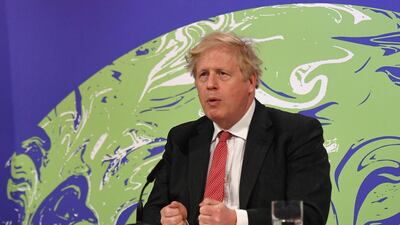British Prime Minister Boris Johnson wants G7 leaders to commit to a new deal to help developing countries decarbonise their economies as he looks to lead ambitious global action on climate change.
In the year of the UK’s twin presidency of the G7 and the Cop26 environment summit, Mr Johnson wants to push through a clean, green initiative that emulates the so-called Belt and Road Initiative, which has delivered strategic Chinese infrastructure investment to nearly 70 countries over the past eight years.
The prime minister will use the platform of the summit in Cornwall this week to secure support for large-scale renewable energy projects in Africa and Asia, with an agreement between the advanced economies of the G7 vital if they want developing countries to back an ambitious commitment to limit global warming to 1.5°C above post-industrial levels.
Observers are watching closely to see if the UK can secure a deal on ending international financial support on coal production, agreed at a virtual G7 summit last month.
Gareth Redmond-King, from the Energy and Climate Intelligence Unit, said the G7 meeting “has unfinished business to attend to” with both the Paris accord rules and gathering a set of ambitious new emissions pledges from member nations essential to keep 1.5°C within reach.
“As it stands, these crucial tasks risk being blown out of the water with that promise from rich nations as yet unfulfilled and the associated trust needed for successful negotiations absent,” Mr Redmond-King said.
Last month, environment ministers agreed to stop direct funding of coal-fired power stations in poorer nations by the end of 2021.
Mr Johnson now wants to push forward on this pledge, as well as an agreement on securing more cash to help fast-growing economies, such as India and Indonesia get clean technology.
While a communique issued after the May meeting said the G7 would phase out new, direct government support for carbon-intensive, international fossil fuel energy, which is expected to target coal and oil, no date for enactment of the policy has been set. Japan, for example, is not in favour of strong strictures against coal.
Another significant proposal from the prime minister this week was a multi-billion-pound green development bank that would fund projects that reduce carbon emissions in the poorest parts of the world.
However, media reports indicate the British Finance Ministry is resistant to donating to the plan before the autumn spending review.
G7 critics say the world will be watching to see if it can deliver on its longstanding pledge to provide $100bn per year to help poor countries respond to climate change.
Only two G7 countries – the UK and the US – have confirmed they will increase climate finance from current levels.
Meanwhile, France is maintaining its current level of climate finance and Canada, Germany, Japan and Italy have yet to state their intentions.
The G7’s current commitments amount to $36bn in public climate finance by 2025, Oxfam say, with only a quarter of that of that intended for adaptation.
Last week, Oxfam said the economies of the G7 nations could see an average loss of 8.5 per cent annually by 2050 ― equivalent to $4.8 trillion ― if leaders did not take more ambitious action to tackle climate change.
The campaign group said for low-income countries the consequences of climate change could be much greater, with a recent World Bank study warning that up to 132 million additional people would be pushed into extreme poverty by 2030 because of climate change.
“The climate crisis is already devastating lives in poorer countries but the world’s most developed economies are not immune,” Danny Sriskandarajah, chief executive of Oxfam GB said.
“The UK government has a once-in-a-generation opportunity to lead the world towards a safer, more liveable planet for all of us. It should strain every diplomatic sinew to secure the strongest possible outcome at the G7 and Cop26, and lead by example by turning promises into action and reversing self-defeating decisions like the proposed coalmine in Cumbria and cuts to overseas aid.”
The energy transition would “undoubtedly require significant economic restructuring from countries that derive large portions of GDP from oil and gas”, according to Oxford Business Group, with about 5 million jobs lost globally in the shift away from fossil fuels.
However, the International Energy Agency said about 14 million jobs will be created because of the development of and investment in renewables.
Mr Johnson's bid to boost the sustainability drive at the G7 comes as the energy industry, which accounts for about three quarters of global greenhouse gas emissions, focuses on carbon-neutral climate plans.
Last month, the Paris-based IEA released its Net Zero by 2050 report, the first comprehensive energy road map detailing how the sector can achieve net-zero carbon emissions by 2050.
The plan features 400 milestones to achieve the target, with the report calling for an immediate ban on investment in new fossil fuel projects globally, along with the prevention of sales of new internal combustion engine passenger cars from 2035.
To meet demand, the IEA expects a massive distribution of renewable energy, which would account for almost 90 per cent of electricity generation by 2050, with a twentyfold increase in solar capacity between now and 2050, and an elevenfold expansion for wind power.
“Making net‐zero emissions a reality hinges on a singular, unwavering focus from all governments – working together with one another, and with businesses, investors and citizens,” the report said.
“All stakeholders need to play their part. The wide-ranging measures adopted by governments at all levels in the net-zero pathway help to frame, influence and incentivise the purchase by consumers and investment by businesses.”

















